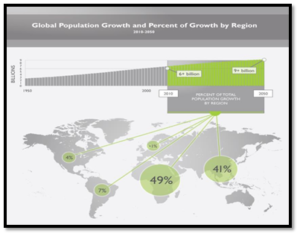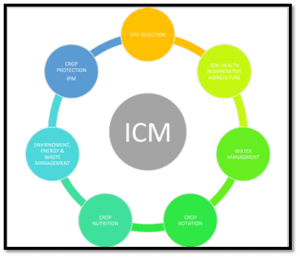Integrated crop management offers an all-round approach to sustainable agriculture. It considers the situation across the entire farm, including the socioeconomic and environmental factors, to deliver the most profitable and also the eco-friendly approach for long-term benefit.
Integrated Crop Management (ICM) is an eco-friendly cultivation method that uses techniques that guarantee lower environmental impact and a reduction of chemical substances’ release into the environment, integrating these with natural input. As such, integrated crop management enables farmers to boost crop productivity while minimizing environmental impact with the help of precision agriculture companies in the USA.
Understanding Integrated Crop Management
Integrated Crop Management is a comprehensive farming strategy integrating various agricultural practices to achieve a balanced and sustainable ecosystem. This approach considers the interdependence of soil health, pest control, water management, and crop nutrition. By adopting ICM, farmers aim to maximize yields, minimize environmental impact, and also ensure the long-term viability of their farming operations.
Global population growth by regions
According to studies, the increase in the global population would require agricultural production to increase by between 60 and 70% to meet food demand in 2050.

Source: Source: Silva, 2018
This will take into account:
- Changes in dietary requirements – increased economic growth in these regions will increase animal protein requirements. In 2016, global meat production was 318 million tons; in 2050, the FAO estimates an increase to 455 million tons. In 2016, 36% of cereal production went into stock feed.
- A significant percentage of grain production will be used in biofuel production. Around 40% of the US corn crop is used in ethanol production.
- An increase in urbanization, especially in Africa and Asia. Currently, almost 55% of the world’s population lives in the urban areas, which will increase to 70% in 2050. Urbanization will increase production pressure on current agricultural land.
There are 1,500 million hectares of arable land globally. Around one-third of this land has been threatened by erosion, seawater, and pollutants degrading soil health and biological productivity. The majority of global fertile land is already used for agriculture. Therefore, new agricultural land will only be expanded in certain regions.
ICM is a holistic farming system that considers all aspects of the specific farm and socioeconomic and environmental factors with a view to long-term sustainability. This concept is illustrated most effectively by the graphic below:

Source: Author and Teicher,H.2019
ICM optimizes yield and profitability and considers pest management, soil care, seed selection, crop nutrition, water management, rural economics, landscape management, agricultural policy, and more.
Fundamental Principles of Integrated Crop Management:
-
Soil Health Management:
At the core of ICM lies a strong emphasis on soil health. Healthy soil provides a solid foundation for crop growth by supplying essential nutrients, retaining water, and supporting beneficial microorganisms. ICM promotes cover cropping, crop rotation, and organic matter incorporation to enhance soil fertility and structure.
-
Crop Rotation and Diversification:
Rotating crops helps to break the pest and disease cycles while maintaining soil fertility. ICM encourages farmers to diversify their crops, mitigating the risk of crop-specific pests and enhancing overall ecosystem resilience. This practice promotes biodiversity and reduces the reliance on chemical inputs.
-
Integrated Pest Management (IPM):
IPM is a core component of an ICM strategy. Instead of relying solely on the chemical pesticides, IPM uses a combination of biological controls, crop monitoring, and resistant varieties to manage pest populations through precision agriculture services in the USA. By minimizing the use of chemical inputs, farmers can protect beneficial insects and maintain a healthier environment.
-
Water Management:
Efficient water use is crucial for sustainable agriculture. ICM encourages the adoption of water-saving technologies such as drip irrigation and rainwater harvesting. By optimizing water resources and enhancing crop resilience, farmers can reduce water wastage, particularly in regions prone to water scarcity.
Benefits of Integrated Crop Management:
-
Increased Crop Yields:
ICM can increase crop yields by optimizing soil health, effectively managing pests, and adopting precision farming. Over the long term, farmers using an ICM strategy often report enhanced productivity and profitability.
-
Environmental Sustainability:
ICM’s focus on reducing chemical inputs and promoting sustainable practices contributes to environmental conservation, including protecting biodiversity. By minimizing the environmental impact of farming operations, ICM aligns with the growing global emphasis on sustainable agriculture.
-
Cost Savings:
Farmers practicing ICM can experience cost savings through the judicious use of resources and the reduction of input costs. Precision farming technologies, in particular, help farmers make informed decisions, minimize waste, and maximize efficiency.
Integrated Crop Management is more than just a farming technique; it’s a holistic approach that addresses the interconnected challenges faced by modern agriculture. By prioritizing soil health, embracing precision farming, and adopting sustainable practices, farmers can unlock the potential for increased yields, environmental conservation, and long-term agricultural success.
In conclusion:
Whether you operate your farm as a startup or as an SME, this process of integrated crop management offers an excellent comprehensive approach to farming that enables you to generate the profit through a sustainable and eco-friendly method. ICM systems like integrated crop-livestock management systems permit you to decrease the wastage and effectively reuse and recycle materials on your plot of land. This practice ensures a highly cost-effective and efficient farming experience for startups, SMEs, and big enterprises.
Integrated Crop Management is more than just a farming technique; it’s a holistic approach that addresses the interconnected challenges faced by modern agriculture. Explore the numerous benefits of diverse precision agriculture technologies with our experts today! Visit https://soiloptix.com/!
